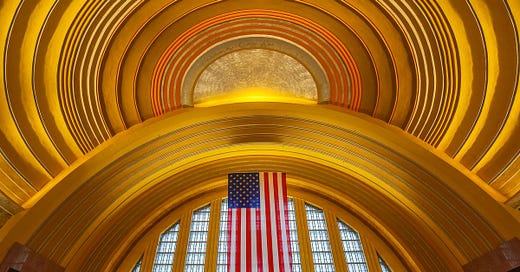How Classical Education is Transforming American Schools
In its recent report, Classical Schools in America: A Movement of Hope, the Heritage Foundation offers a quiet cartography of the growing alternative educational movement stretching across the U.S.
From Bangor to San Diego, parents are fleeing the fluorescent-lit holding pens we call public schools—those strange institutions where adolescence is prolonged indefinitely and knowledge fragmented beyond recognition—and are instead embracing what can only be described as a resurrection of the dead: classical education.
According to a Heritage Foundation report that landed on my desk this morning, over 1,000 classical schools now dot the American landscape, with 250 founded since 2020. The numbers have a dry, bureaucratic quality about them, but behind these figures lurks a metaphysical rebellion of the first order. These parents aren't merely switching educational brands like someone might switch from Coke to Pepsi; they're rejecting an entire worldview.
What do these classical schools offer that our technological utopia cannot provide? The Heritage study of 882 such institutions reveals something both ancient and revolutionary. First, these schools stubbornly insist that wisdom can be transmitted across generations. Second, they aim not to produce efficient economic units but human beings equipped for lifelong learning. Third—and here's the real scandal—they believe character matters as much as intellect.
The educational methodology reads like something from a medieval manuscript: 85% teach the classical liberal arts—grammar, logic, rhetoric, arithmetic, geometry, astronomy, and music—while 89% still ask the young to wrestle with ancient languages like Latin or Greek. Picture 15-year-olds parsing Virgil’s hexameter instead of scrolling through Instagram stories, and you’ll understand why our therapeutic managers find the whole enterprise so unsettling.
What’s stranger still is that 80% insist students read “great books”—not excerpts, not summaries, not textbooks written by committees, but the actual works of Homer, Euclid, Shakespeare, and the Founding Fathers. It’s as if they believe these books contain something our age of infinite information somehow lacks.
Memory work appears in 60% of these schools. Logic gets its own dedicated coursework in 65% of them, as if clear thinking were something that required discipline rather than a smartphone app. The whole enterprise has the faint odor of resistance, of people who refuse to believe that the latest educational software update represents the pinnacle of human development.
The most subversive element, however, may be classical schools’ view of parents. Nearly 70% explicitly state that parents are the primary educators of their children— not the state, not the experts, not the algorithm. Some even invite parents to study alongside their children, creating book clubs where adults and adolescents alike grapple with Aristotle’s Ethics or Tocqueville’s Democracy in America. Imagine that—parents and children forming a community of learners rather than demographics separated by technological competence.
University of Notre Dame sociologists, examining these classical school graduates, found something puzzling: these students showed greater life satisfaction, resilience, and intellectual independence than their conventionally educated peers.
University of Notre Dame sociologists, examining these classical school graduates, found something puzzling: these students showed greater life satisfaction, resilience, and intellectual independence than their conventionally educated peers. After controlling for demographic factors, the difference remained, suggesting that perhaps there's something to this ancient approach after all.
What we're witnessing may be more than an educational trend. It appears to be a response to the creeping sense that our culture has transformed adulthood into an extended adolescence, complete with anxiety disorders. As young Americans increasingly delay work, marriage, and family—traditional markers of grown-up status—American classical schools offer a radical alternative: the notion that children can be prepared for adult responsibilities through encounter with mankind's greatest thinkers.
It's a peculiarly American form of rebellion—not burning things down but building something new by resurrecting something old. These educational pioneers aren't fleeing modernity for some golden age that never existed. They're simply suggesting that perhaps our ancestors weren't complete fools after all, and that wisdom doesn't have an expiration date.
Michael S. Rose, a leader in the classical education movement, is author of The Art of Being Human, Ugly As Sin and other books. His articles have appeared in dozens of publications including The Wall Street Journal, Epoch Times, New York Newsday, National Review, and The Dallas Morning News.






“fluorescent-lit holding pens” Brilliant. I remember having lunch with my seventh-grader at his public school, squeezing onto the metal bench of seeming endless rows of picnic tables. The noise was deafening. Adult monitors roamed between the tables, hands poised on walkie talkies, ready to squelch nascent trouble. The scene looked like a prison chow hall- at least like those I had seen in movies. I thought at the time, and still do, that if one wants to see what a public school is like, visit the lunch hall.